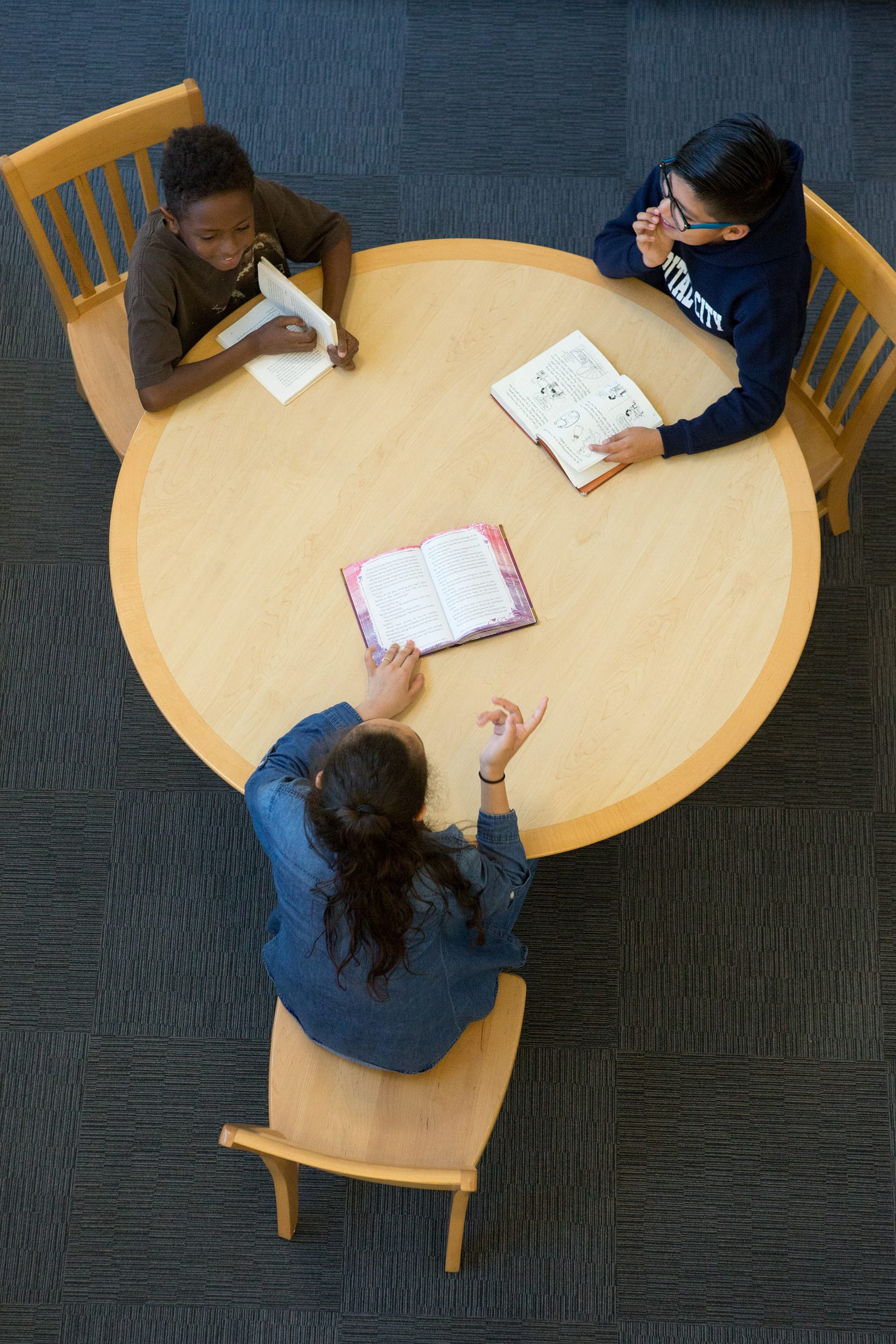The Education Policy Hotlist
Top news in U.S. education policy for the week of October 9th - 13th
Welcome back to the Education Policy Hotlist!
I hope you are having a great Friday. I have some exciting news to share with you. Last night, I joined my Portland friends in hosting our second annual fundraiser for Portland Backpack, a wonderful non-profit that provides free food sacks for over 1,200 children in our area every weekend. Thanks to your generous support, we surpassed our fundraising goal, and we can now expand our capacity in the next year. If you want to know more about this fantastic cause or make a donation, please let me know. I love that this event brings together local school leaders, business partners, and community members who care about our children and want to fill the gap for their needs. I even had some kids at my table because they are always my priority.
I also want to share some thoughts with you after attending the NSVF event last week. We must rethink how we approach some of the significant issues in education today. Instead of taking sides and seeing things in black and white, we must embrace the gray matter's complexity and uncertainty. This will allow us to have more honest and productive conversations that can bring evidence and nuance into the public narrative and strengthen our collective efforts to transform systems. We also need to diversify who we invite to these conversations. We can’t keep having the same people saying the same things repeatedly. We need to hear from those with different perspectives and experiences, especially those most affected by our work. As a school leader said last week, we must set new tables, not kiddie tables. So, my challenge to you this week is this:
When you go to an event, a lunch, or a panel, look at who is at your table and ask yourself:
Is this going to be an easy or a complicated conversation?
Am I making everyone comfortable or uncomfortable?
Am I hearing something new or something old?
Let’s commit to setting new tables reflecting our communities' diversity and reality — this might be the more difficult! This is the only way to genuinely change the public narratives and make a difference in education.
Warmly,
Christine
Mark Your Calendars
Tuesday, October 17th at 2:30 p.m. (EST), CCSSO is hosting a webinar titled Inclusive Practices in Action, Featuring Poway Unified School District. Register here.
Tuesday, October 24th at 11:00 a.m. (PST) join a rockstar panel for a conversation about enacting change and shifts that support equity, justice, and anti-racism. Register here.
Tuesday, October 24th at 2:00 p.m. (EST), please join FutureEd for a webinar about Taking the Science of Reading to Scale. Register here.
Tuesday, October 24th at 4:00 p.m. (EST), Fordham is hosting an in-person event to discuss their recent report, Excellence Gaps by Race and Socioeconomic Status. Register here.
Tuesday, November 8th at 9 a.m., 3 p.m., and 9 p.m. (EST), Teach AI is hosting a webinar to review their new AI guidance and toolkit. Register here.
Collaboration for Community
Philanthropy and local government: A powerful partnership for change
This Forbes article by Alison Griffin explores how some cities in the U.S. are collaborating with philanthropic organizations to address some of the most complex challenges facing their communities, such as housing affordability, infrastructure, economic development, and education. The article features examples from Atlanta, Birmingham, and Denver, where civic leaders and philanthropists create innovative and inclusive solutions that benefit the residents and the local economy. Alison also discusses the role of philanthropy in challenging the status quo and taking risks on cross-sector solutions that may not be possible at the federal level.
Technical assistance centers to support student well-being and academic success
The U.S. Department of Education announces the launch of technical assistance centers to support state and local efforts to enhance student well-being, academic success, and school safety. A new press release explains that assistance centers will help education leaders to implement strategies backed by research and best practices to accelerate learning, meet students’ mental health needs, and expand academic opportunity and success. Check out the release for examples of the technical assistance centers, such as the Comprehensive Literacy State Development Center, the National Technical Assistance Center for 21st Century Community Learning Centers, and the National Technical Assistance Center on Positive Behavioral Interventions and Supports.
Economic Prosperity
How to improve the economic prospects of young Americans from disadvantaged backgrounds
A new piece by Brookings and Child Trends reveals the low earnings and limited opportunities of many young adults in the U.S., especially those from low-income or less-educated families. The study suggests policy interventions to create a better school-to-career pipeline to help them acquire the skills and credentials needed to succeed in the labor market. These include expanding dual enrollment and early college programs, strengthening career and technical education, increasing financial aid and support services, and creating more pathways to high-quality apprenticeships and work-based learning opportunities.
Outcomes and Accountability
New Hampshire and Wisconsin: A comparison of state test scores
A new State Assessment Data Substack analysis explores Smarter Balanced Assessment Consortium (SBAC) test scores in English language arts (ELA) and math for the 2022-23 school year in New Hampshire and Wisconsin. The article compares students' performance in both states on the tests, which measure students’ proficiency in the Common Core State Standards. The report also discusses factors that may explain the differences in test scores, such as student demographics, test participation rates, and COVID-19 impacts.
The benefits of third-grade retention for struggling readers and their siblings
A new study shows that Florida’s policy of holding back third graders who fail a reading test improves their reading skills and positively affects their younger siblings. The study compares the outcomes of retained students and their promoted peers and finds that the former have higher reading scores, graduation rates, and college enrollment rates. The study also finds that the younger siblings of retained students are more likely to pass the third-grade reading test and have higher test scores in math and science.
North Carolina’s Operation Polaris: A strategic plan to address learning loss
In 2021, North Carolina launched a comprehensive initiative called Operation Polaris to help public school units recover and accelerate learning after the COVID-19 pandemic. The initiative is led by the Office of Learning Recovery and Acceleration (OLR), which provides information and support for evidence-based decision-making by school leaders. You can learn more in this ECS article that highlights voices directly from the state agency.
Why does this matter anyway? North Carolina is a stand-out state because of their longstanding commitment to data and evaluation. This is especially true when it comes to their pandemic response efforts.
Education Technology
Did CZI transform personalized learning through ed-tech?
A new study shows that Summit Learning, an online platform funded by Mark Zuckerberg’s philanthropic organization, the Chan Zuckerberg Initiative (CZI), had no significant effect on student achievement. The study is the latest setback for CZI’s ambitious plan to use technology to personalize learning for every student in America. This piece explores why CZI’s education strategy did not work out, such as the lack of evidence for personalized learning, the resistance from teachers and parents, and the complexity of the education system.
The pros and cons of banning smartphones at schools
Several studies have examined how banning smartphones at schools affects students’ academic performance, mental health, and physical activity. The results suggest that smartphone bans can lead to higher test scores, less anxiety, and more student exercise. Still, they also pose challenges for student safety, privacy, and learning needs. This article explores some of the different smartphone policies schools have adopted and their implications for student outcomes.
Generative AI: A new era of machine intelligence in education
In Education Next, John Bailey explores how generative AI can produce creative and sophisticated content in response to natural language instructions. The article also discusses how generative AI can influence how students learn, how teachers work, and how we structure our education system. John examines some benefits and risks of using generative AI in education, such as enhancing student engagement, personalizing learning, supporting teachers, improving outcomes, and raising ethical questions around bias, plagiarism, privacy, and job loss.
Student Well-Being
Play-based learning: A new trend in U.S. education policy
How three states are transforming their education systems by adopting play-based learning, an approach that aligns with the science of how children learn.
Play-based learning is a pedagogical method that emphasizes child-initiated, active, and creative world exploration.
New Hampshire, Oklahoma, and Connecticut have passed legislation that mandates or encourages play-based learning in pre-K through 3rd grade.
Play-based learning requires professional development for teachers to implement it effectively and sustainably.
Dr. Christine Pitts is an executive leader, advancing public policy for social impact. Follow her on LinkedIn and Instagram for more updates.






